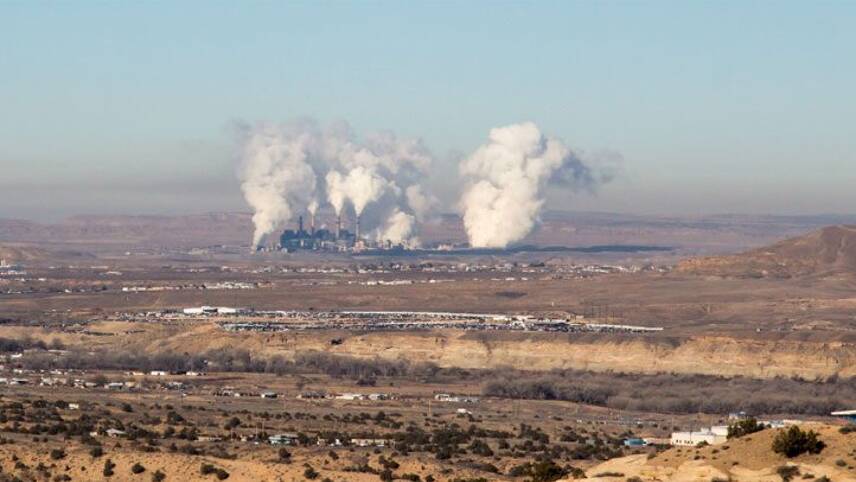Register for free and continue reading
Join our growing army of changemakers and get unlimited access to our premium content

Pictured: The San Juan Generating Station
That is according to a major new report from Bloomberg NEF and Bloomberg Philanthropies, entitled the ‘Climate Policy Factbook’. Policies assessed cover three areas: phasing out financial support for fossil fuels, putting a price on emissions and encouraging climate risk disclosure. Of the G20 nations, only France and Italy were deemed to be making good policy progress in all three respects.
Particular alarm is sounded over the lack of progress in phasing out financial support for fossil fuels. The report highlights the fact that direct support for fossil fuels from the G20 governments in 2019 topped $636bn – a decrease of just 10% since the ratification of the Paris Agreement in 2015.
Indeed, seven of the members had actually increased financial support during this period, namely Canada, the US, Australia, Indonesia, France, China, Brazil and Mexico.
During the five-year period assessed, nations collectively provided $3.3trn in fossil fuel subsidies, the report states, with 60% going to producers and utilities and 40% going to consumer-facing subsidy schemes. This figure is likely to be an underestimate, Bloomberg believes.
Direct financial support, the report argues, “distorts prices and risks increasing investment in emission-intensive assets with long lives”.
Bloomberg NEF’s head of global policy Victoria Cuming elaborated: “This funding really encourages the potentially wasteful production and use of fossil fuels and can mean emission-intensive assets are funded today, thereby locking in their emissions for decades.”
The $3.3trn, the report states, could have funded the creation of 4,232GW of new solar power plants — a capacity of more than 3.5 times the size of the US grid.
The G20 agreed in 2009 to phase out “inefficient” fossil fuel subsidies, but no binding date was set and green groups have accused the group of failing to properly define the term.
This year’s G7 meeting saw members agreeing to end direct government support for new thermal coal generation capacity without co-located carbon capture and storage (CCS) technologies by the end of this year. All other “inefficient” fossil fuel subsidies will then be phased out by 2025. However, Canada did not sign the final communique from the summit in Carbis Bay, Cornwall.
The Bloomberg NEF report comes in the same week that a new analysis from the World Benchmarking Alliance (WBA), CDP and ADEME revealed that the oil and gas sector is set to burn through some 80% of the total global carbon budget the world will need to stick to if the Paris Agreement’s 1.5C trajectory is to be realised by 2050. That study covered state-owned fossil fuel companies as well as the private sector.
Carbon pricing and climate risk
Coming on to the other policy areas covered in the Bloomberg NEF report, G20 nations were again found to be faring poorly.
On carbon pricing, 12 countries have implemented at least one national policy – but the report states that only six of these nations have taken measures that will “drive meaningful emissions reductions” (i.e. they involve a high enough price and cover a large enough share of emissions).
France, Italy and Germany are named as the leaders on carbon pricing, “in no small part due to their participation in the EU’s Emissions Trading Scheme (ETS)”. Canada and the UK, which recently launched its own post-Brexit ETS, also fare well in the report’s rankings.
G20 nations with no carbon pricing are Brazil, India, Indonesia, Russia, Saudi Arabia and Turkey. Nations where carbon pricing per tonne is deemed, by the report, to be too low, include Argentina ($10), Australia ($12), South Korea ($12), South Africa ($8), China ($6), the US ($6), Japan ($3) and Mexico ($2). Italy, the nation with the highest average price over the period studied, topped $67 per tonne.
On climate risk disclosure, the report paints a picture of warm words but little policy action. The UK and the EU have enforced climate risk disclosure policies to align businesses with the recommendations of the Taskforce on Climate-Related Disclosures (TCFD). This covers the UK, Germany, Italy and France, but no other G20 members have legislation on this topic. The G7 meeting saw Finance Ministers agree that TCFD-aligned disclosures should become mandatory, but this is yet to be translated into law for Canada, the US or Japan.
Bloomberg NEF’s Cuming summarised: “Given that the G20 accounts for nearly three-quarters of global emissions, progress from those governments in these three areas would mark a huge step forward toward tacking climate change. So far, they have yet to step up to the plate.”
Sarah George


Please login or Register to leave a comment.